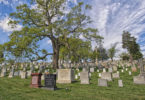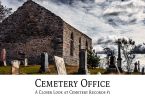If you are researching your family at historic cemeteries, there may not be cemetery records available, depending on how old the cemetery is. In Europe, you may be able to find these records at ancient parish churches that are still operational, or mentions of burials in local wills or other probate documents at the local court. You at least have a chance of finding something.
In America, though, any cemetery that was established prior to the mid-1800s may not have an office available for you to go to, and if the cemetery is a town one and not attached to a church, or if it is a small family cemetery, there may be no good place for you to look for records. This does not mean you cannot clean any information from a historic cemetery. You just have to be a little creative. This is what you do when dealing with a historic cemetery with no obvious records available.
Check the Church: While not all historic cemeteries are attached to a church, some will be. If the one you’re looking at is attached to a working church, be sure to go in and talk to the minister or the record keeper (or whoever the person in charge refers you to), and determine if any of the records of ancient burials at the church were kept, and if so, where you can find them. If the church the cemetery is attached to is no longer in operation, check the local historical society to find out of the records were sent there. Alternatively, check the national office of the church’s denomination to learn if perhaps the records were sent there.
Check the Historical Society: Town cemeteries in colonial America did not keep records very well, and sometimes they simply don’t exist (or they did, but the records were lost). If they did exist, a lot of times the local historical society took possession of them. When looking for the records for historical cemeteries, it is always worth a check in at the local historical society. You may be surprised at the wealth of local resources some of them have. This isn’t the case with every historical society, but it is definitely worth checking there. If they don’t have the records, they may be able to direct you to where to find them.
Look at the Headstones for Clues: If you can’t find a location for the records, or if they didn’t (or no longer) exist, check the headstones in the cemetery. They can offer clues as to who is buried there, who might be buried there, and family relationships among the owners of the different stones. Similar surnames in a cluster of stones next to each other are usually relatives. You can make notes of possible family relationships to explore by writing down the dates on each stone, which should distinguish one generation from another. Also, dips in the ground or large spaces between the stones can indicate unmarked burials of potential relatives. Make sure to indicate these clues in your notes, so you can look for evidence of potentially previously unknown ancestors in your family tree.




